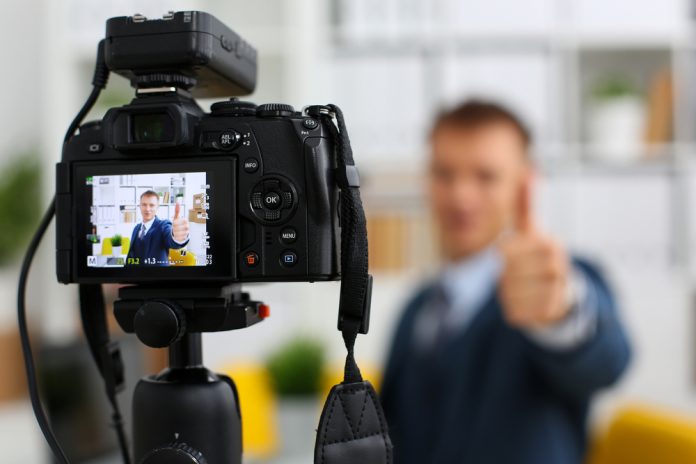
One of the most common barriers to making videos is many people hate being on camera. Of course, there are all kinds of videos you can make without ever having to show your face, but if you DO have to appear on camera, a few simple tips can go a long way to help you feel better.
If you’re looking to create internal communications, social media clips, or professional-looking YouTube videos, this blog post will show you exactly what to do to get comfortable in front of the camera.
Looking good is key
When you look good, you feel good. Here are a few ways you can look better in your videos.
1. Posture
No one looks good all slouched over. The first key to looking good on camera is to remember to stand up (or sit up) straight. Keep your shoulders rolled back and your chin up.
You’ll look more confident and, ultimately, feel more confident, too.
2. Body language
How you present yourself physically tells people a lot about what you feel inside.
Face the camera and let your arms hang naturally at your side. If you’re a hand talker, it’s also okay to be more animated with your arms and hands, as long as you don’t overdo it.
3. Know where to look
Many of us find it pretty daunting to look directly into the camera, but that’s really your best bet. At the very least, you should be looking about two inches above it. To your audience, it’ll look like you’re looking directly at the camera.
4. Smile!
A smile tells your audience that you’re happy to be sharing knowledge with them and will help them feel better about you. But, make sure that your smile looks genuine. A pasted-on, fake smile can make your audience feel uneasy, and you certainly don’t want that.
5. Dress for success
Dress comfortably, but appropriately for the situation and subject matter. A three-piece suit probably won’t be right for an outside shoot in the woods, but hiking gear probably won’t be appropriate for a report on your company’s Q2 profits.
Pro tip: if you will use a lav mic, you may want to wear a blazer or sportcoat, or at least a button-up shirt. It’ll be easier to hide the cord and place the mic at an optimal level to capture your voice.
How to speak confidently on camera
Even the best-looking on-camera personality will have trouble engaging an audience if they can’t remember what they’re talking about or mumble their way through a segment. Luckily, gaining confidence in your on-camera speech isn’t that hard.
6. Know your topic
The most important thing you can do to speak confidently is to know your subject matter and main points. As you gain experience, you may be better at winging it, but there is simply no substitute for being prepared.
7. Have a script
A good script gives you a chance to ensure you actually get to say everything you want to say. When you try to wing it, you may forget a crucial point or wander off topic.
Even a bullet point list of your most important information is better than nothing.
8. Practice practice practice
Take your script or bulleted list and run through it a few times. Make sure there isn’t an awkward phrase that makes you stumble over your words. Take some time to think about pauses and inflection, so you don’t sound like a robot.
Also, don’t be afraid to use cue cards or a teleprompter if one is available.
A few other things to consider to get comfortable on camera
While I’ve covered most of the basics on how to be better on camera, there are a few other things that can help, as well.
9. Make sure you have plenty of time
Nothing can make you feel more anxious and unprepared as having to rush around because of a looming deadline. Whenever possible, plan your shoot with enough time to accommodate issues such as other people not being on time, problems with hardware, problems with software, and other things that may be out of your control.
10. Hydrate
If you know you’re going to be shooting, I suggest you start hydrating at least 24 hours before a shoot. It takes a while for your body to truly absorb the moisture you’re putting in, so you want to give it the time it needs.
On the day of the shoot, keep hydrating. You don’t have to overdo it, but drink plenty of water and be sure to have water and maybe even some hot tea available with you while you’re shooting. Your voice (and your audience) will thank you.
The final tips
11. Mark your spot
If you will be moving, make sure you place markers on the floor so you know where to be and your camera knows where to follow.
12. Limit distractions
It may be fun to have an entourage, but having too many people with you could distract you from the job at hand. Other distractions can include anything from social media to texts from your mom. Bottom line: If it will distract you from the job at hand, put it aside until you’re done.
13. Forget about perfection
Remember that your video doesn’t have to be perfect to be good. Your audience will appreciate knowing you’re human, so a slight word fumble isn’t the end of the world. Keep going and finish strong.
Just like anything else, being good on camera takes practice. The more you do it, the better you’ll get. But these tips can help you jumpstart your confidence and ensure that whether it’s your first time on camera or your 1,000th, you’ll look and sound as professional as possible.




